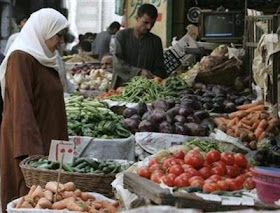Terrified of the secular/modern/liberal demonstrators who made their presence known in Tahrir Square, as well as of the soccer hooligans, Mohamed Tantawi and Egypt's Supreme Council of the Armed Forces have forged a mutually beneficial relationship with the country's Islamists, thereby blocking their joint opponents from power. Very clever – but maybe too clever by half. Here's why:
In Egypt, which imports more than half its caloric intake, wages must keep up with the price of food or people begin to starve. Yet the country appears to be heading for a monumental financial collapse. If Islamists strut about as though they rule Egypt, the population will blame them and their SCAF allies – not the Tahriris – for its hunger. The anger could quickly turn ferocious. After waiting 84 years to attain legitimacy and power, the Muslim Brotherhood may find it got suckered into taking over the ship's helm just as it heads into an iceberg.

Over half of Egypt's caloric consumption comes from abroad, leaving the country vulnerable to international staple prices.
|
Comments:
- A joke circulating during Hosni Mubarak's reign ("Why hasn't Mubarak appointed a vice president?" "Because he can't find anyone dumber than he is") appears to be wrong. Tantawi is even more incompetent than Mubarak.
- Military dictatorship, which has been firmly in control of Egypt since 1952, has so badly run the country into the ground that its rule finally appears to be in jeopardy.
Nov. 6, 2012 update: Egypt's Ministry of Utilities announced its intention today to quadruple the price of water to consumers over the next five years, ending a long-standing subsidy.
Feb. 10, 2013 update: Alexandre Goudineau writes about current economic developments in Egypt Independent that
retail and import sources are warning that the ongoing devaluation of the [Egyptian] pound will lead to large price raises in the immediate future, especially those of imported products. These price raises, experts say, will shock the Egyptian economy and drive it into further crisis. A source from a leading mass retailer told Egypt Independent that the company had already started to feel the impact on its supply prices. The source predicted that consumers will see an up to 20 percent price increase on imported products. Local products are likely to have their prices increase as well, but to a lesser extent than the imported ones. Egyptian products will directly be impacted, as most of them contain imported components such as raw materials, packaging and additives, experts say. And this general surge in prices, they say, will put inflationary pressure on all production costs.This trend has particular implications for carbohydrates, which make up about three quarters of the Egyptian diet. "Cereal and roots represent nearly two-thirds of the diet, and wheat alone makes up one-third. Reports place Egyptians as the world's biggest per capita bread consumers, and Egypt as the world's biggest wheat importer." Indeed, Minister of Supply and Internal Trade Bassem Auda just announcedbread rationing of three loaves per capita to begin shortly.
Looking at Egypt's poor finds harrowing statistics: According to a World Food Program survey in September 2012, 86 percent of poor households have insufficient income to cover monthly needs, up from 74 percent in June 2012. In those poor households, 62 percent of spending goes to food and 14.5 percent are already eating less.
Mar. 5, 2013 update: Ahmed Kamel writes about Egypt's main staple in the Egyptian Gazette: "Despite soothing official assurances that Egypt's reserves of wheat are enough to cover local consumption until the end of the year, analysts warn against a bread crisis in the coming months, due to a shortage of hard currency."
Apr. 15, 2013 update: David P. Goldman, writing as "Spengler," notes that "Egyptians are getting hungry."
The fall of the Egyptian pound to just 60% of its 2012 exchange rate against the dollar has priced everything but bread out of the reach of the poorer half of the population, and the bread supply is now at risk. … The half of Egyptians that lives on $2 a day no longer eats beans, let alone milk products. … The only basic foodstuffs still available to poor Egyptians are state-subsidized bread, sugar and oil. That may change drastically during the next several months. …
Currency devaluation has already imposed de facto rationing of essential commodities, and the shortage of diesel, propane gas cylinders, and other essential items has imposed energy rationing. The question is how long Egyptians can go hungry before the Morsi regime loses its capacity to govern.
The only practical assistance the US has provided to the Morsi government took the form of a shipment of 140,000 teargas canisters. This arrived at the Abadeya Port in Suez, the Egypt Independent reported April 8. As matters stand, Morsi will need them. Perhaps Washington could follow up by donating coffins.
-----
If you found this post interesting or informative, please  it below. Thanks!
it below. Thanks!
 it below. Thanks!
it below. Thanks! 
The look on the faces of the Obamatrons will be priceless when Obama supplied lethal weapons are used to mow down Egyptians once the food riots start up in earnest. Of course the NYT will blame the Jews, but so what. They were going to anyway.
ReplyDelete